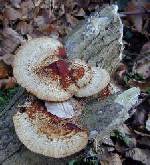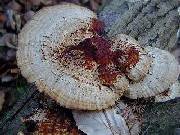Back to the Lists and Home page
Ryedale Natural History Society: Fungi
I am hoping to develop the Fungi part of the website with the help of our Recorder Rhona Sutherland, but at present we do not have much information on Ryedale fungi. I have some photos (below) but as I am not an expert on fungi the identifications are provisional.
Here is Rhona’s summary of Fungi for 2020.
Rhona has provided a list of all fungi that have ever been recorded in Ryedale - an impressive 1333 species. I have appended this below. You will also find a list of English names and a link to useful books and websites.
Rhona has written notes on our forays to Birch Wood in October 2020, and Hazel Heads Wood in September 2021.
Here is an interesting note on a fungus new to the area, The Cedar Cup Geopora sumneriana.
And an unusual rust (Gymnosporangium sabinae) on an ornamental juniper.
She has also written this helpful guide to help you get started.
She has also put together a gallery of photos of local fungi; and you can also view my 2018 pictures- Bracket fungus on dead wood, probably willow
- (Different) bracket fungus on live Prunus sp.
- Amanita spp. growing under sweet chestnut
- Various woodland fungi
- Inkcaps
- Fly Agaric and Giant Puffball 2002
- Fungi at Rudland October 2003: agaric, dryad’s saddle and Lactaria
Please record any fungi you might find using this form.
Bracket fungus growing on dead wood, probably Willow
Bracket fungus growing on an ornamental Prunus
Autumn 1999
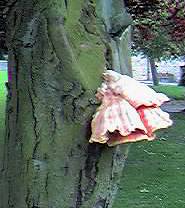 |
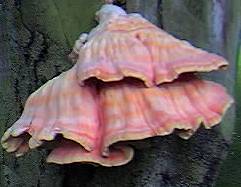 |
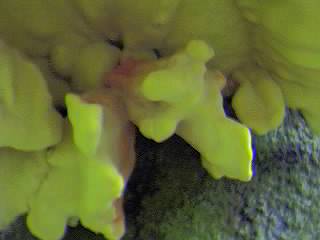 Underside |
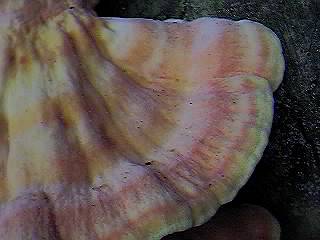 Detail (top) |
Amanita sp. growing in grass under sweet chestnut trees
Autumn 1999
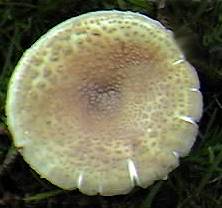 |
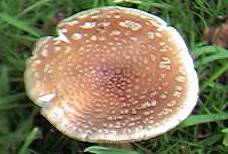 |
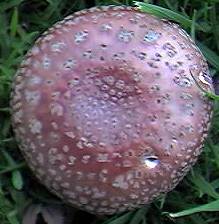 |
Various woodland fungi (October 11th 1999)
 Yellow ? Russula sp. |
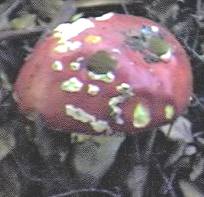 Fly Agaric under Birch: the archetypal toadstool, much commoner in some years than others. |
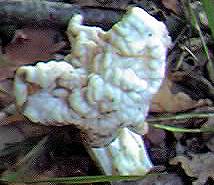 ? Helvella crispa under Birch |
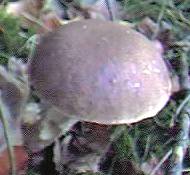 Birch Bolete: one of the Boletus family with a sponge-like underside rather than normal gills |
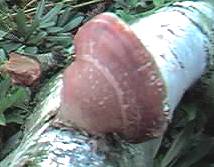 Birch Bracket: very common on old, dead and dying birches |
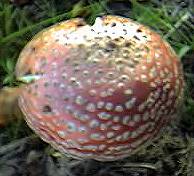 Fly Agaric (24th October) |
Woodland Fungi October 8th 2000
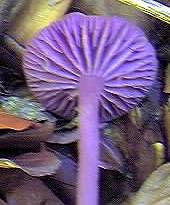 A small purple fungus growing under beech, probably the Amethyst Deceiver Laccaria amethystea. |
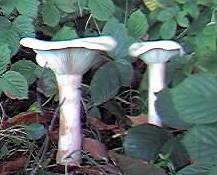 White fungi, part of a ring about 3' across, growing under beech. |
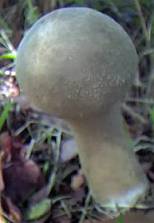 A puffball, one of a group growing at the bottom of a fallen dead tree trunk, probably beech. |
Inkcaps
Inkcaps (Caprinus comatus) are a common sight. These toadstools, also known as Lawyers Wig, appear in grassland, trackside edges etc. and develop very rapidly. At first the toadstool has a tightly closed cap and whitish gills, but then the cap opens from the bottom, with the edges curling back to reveal the gills. At this stage the spores develop fully, and the gills disintegrate to release them as a black, sticky liquid.
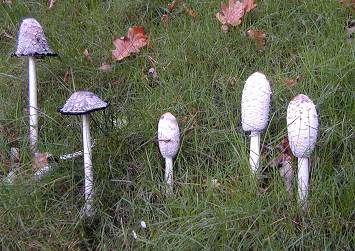 Group of inkcaps, showing various stages in the development, from the tightly closed caps at the right through the “lawyer’s wig” stage (far left) to the fully mature toadstool with dripping spores (second left). |
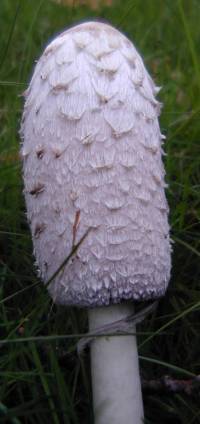 Detail of a young inkcap with the cap just beginning to open. |
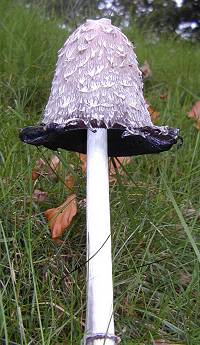 A slightly older specimen showing how the spores drip out as the gills disintegrate from the bottom, revealing more of the stalk. |
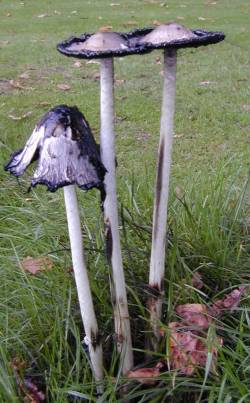 A group of three mature specimens, showing how the cap curls back and eventually almost completely disintegrates; black streaks of spores can be seen on the exposed stalks. |
Fly Agaric and Giant Puffball Autumn 2002
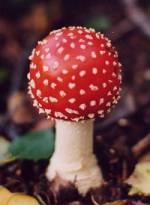 Young Fly Agaric
Young Fly Agaric |
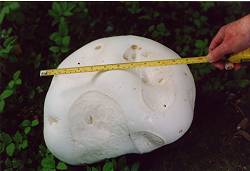 Giant puffball 11" across |
Fungi seen at Rudland October 2003
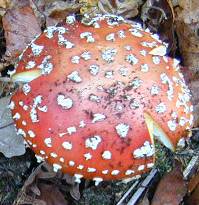 Fly Agaric |
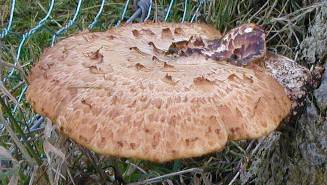 Dryad’s saddle polypore |
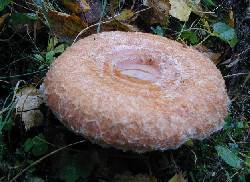 Lactarius torminosus |
Checklist of all fungi recorded in Ryedale
This list includes lichens, as well as many historic records. You should be able to search it (Ctrl-F in most browsers).
Links to books and websites
Back to the Top
© Copyright Ryedale Natural History Society 1999 - 2021
All photos on this page © Gill & Adrian Smith except
Fly agaric and Giant puffball 2002 © Tom Denney & Don SmithBack to the Lists and Home page
